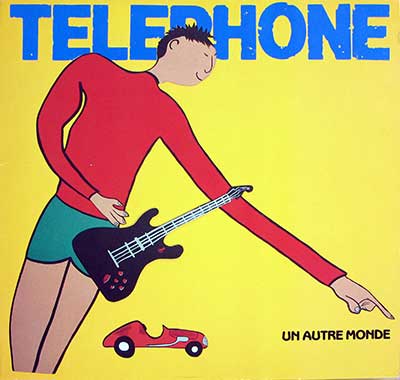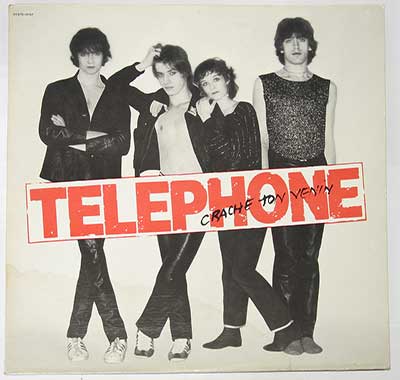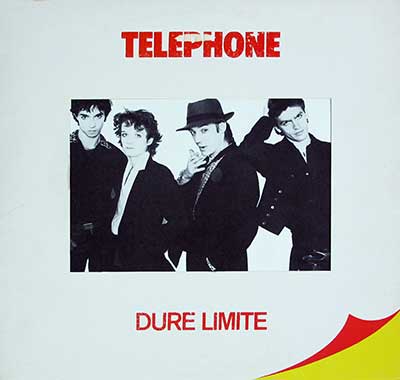TELEPHONE French New Wave BAND
The TELEPHONE music group was a French rock band that emerged in the late 1970s and had a significant impact on the French music scene. The band was formed in 1976 in Paris by four members, namely Jean-Louis Aubert, Louis Bertignac, Corine Marienneau, and Richard Kolinka. The band's name was inspired by the American rock band The Doors, and it represented the band's desire to communicate with its audience.
The band's music was a mix of rock, punk, and new wave, and it was characterized by its energetic and catchy melodies, as well as its socially conscious lyrics. The band's debut album, titled "Telephone," was released in 1977 and featured hit songs such as "Hygiaphone" and "La Bombe Humaine." The album was a critical and commercial success, and it established the band as one of the leading rock groups in France.
Over the next few years, TELEPHONE released several more albums, including "Crache Ton Venin" (1979), "Au Cœur De La Nuit" (1980), and "Dure Limite" (1982). These albums showcased the band's evolution and growth as musicians, as well as its commitment to social and political causes. The band's music became more complex and experimental, and its lyrics tackled issues such as unemployment, social inequality, and environmentalism.
One of the band's most significant achievements was its role in the development of the French rock scene. In the 1970s, French music was dominated by traditional chanson and pop music, and rock music was considered an outsider genre. TELEPHONE's success helped to change this perception, and it paved the way for other French rock bands such as Noir Désir, Les Rita Mitsouko, and Mano Negra.
Despite its success, the band faced internal conflicts that ultimately led to its dissolution in 1986. Bertignac left the band in 1985 to pursue a solo career, and the other members decided to disband the group the following year. However, the band's influence on the French music scene continued, and its legacy is still celebrated today.
Le groupe de musique TELEPHONE était un groupe de rock français qui a émergé à la fin des années 1970 et a eu un impact significatif sur la scène musicale française. Le groupe a été formé en 1976 à Paris par quatre membres, Jean-Louis Aubert, Louis Bertignac, Corine Marienneau et Richard Kolinka. Le nom du groupe a été inspiré par le groupe de rock américain The Doors, et il représentait le désir du groupe de communiquer avec son public.
La musique du groupe était un mélange de rock, de punk et de new wave, caractérisé par ses mélodies énergiques et accrocheuses, ainsi que par ses paroles socialement engagées. Le premier album du groupe, intitulé "Telephone", est sorti en 1977 et a présenté des tubes tels que "Hygiaphone" et "La Bombe Humaine". L'album a été un succès critique et commercial et a établi le groupe comme l'un des groupes de rock leaders en France.
Au cours des années suivantes, TELEPHONE a sorti plusieurs autres albums, notamment "Crache Ton Venin" (1979), "Au Cœur De La Nuit" (1980) et "Dure Limite" (1982). Ces albums ont mis en valeur l'évolution et la croissance du groupe en tant que musiciens, ainsi que son engagement en faveur de causes sociales et politiques. La musique du groupe est devenue plus complexe et expérimentale, et ses paroles ont abordé des problèmes tels que le chômage, l'inégalité sociale et l'environnementalisme.
L'une des réalisations les plus significatives du groupe a été son rôle dans le développement de la scène rock française. Dans les années 1970, la musique française était dominée par la chanson traditionnelle et la musique pop, et la musique rock était considérée comme un genre marginal. Le succès de TELEPHONE a contribué à changer cette perception et a ouvert la voie à d'autres groupes de rock français tels que Noir Désir, Les Rita Mitsouko et Mano Negra.
Malgré son succès, le groupe a connu des conflits internes qui ont finalement conduit à sa dissolution en 1986. Bertignac a quitté le groupe en 1985 pour poursuivre une carrière solo, et les autres membres ont décidé de dissoudre le groupe l'année suivante. Cependant, l'influence de TELEPHONE sur la scène musicale française a continué, et son héritage est encore célébré aujourd'hui.

Virgin 70248 , 1984 , Made in France
Telephone's 1984 album "Un Autre Monde," produced by Glyn Johns, epitomizes the fusion of French New Wave and Rock during the vibrant 1980s music scene. The collaboration with The Who's John Entwistle enriches the album's sonic landscape. A timeless masterpiece, it stands as a testament to Telephone's artistry, encapsulating the spirit of the era and leaving an indelible mark on the musical legacy of 1984.
Learn more
EMI Pathe 2C 070-14737 , 1979 , Made in France
"Crache Ton Venin," Telephone's 1979 masterpiece, epitomizes the musical zeitgeist of the late '70s. This 12" Vinyl LP, produced by Martin Rushent, seamlessly blends rock, punk, and new wave influences. The album's tracks delve into societal critique and introspection, creating a sonic journey that transcends conventional boundaries. With Rushent's production finesse, "Crache Ton Venin" is an enduring testament to Telephone's artistic prowess and its lasting impact on French rock.
Learn more
Virigin 201915 , 1982 , Made in France
"Telephone: Dure Limite" commands attention with its Die-Cut Cover on the 12" Vinyl LP Album. The fourth studio album by the French rock band Téléphone, released in 1982 on Virgin Records, showcases the band's dynamic sound. With tracks resonating from the heart of French rock, "Dure Limite" not only stands as a musical gem but also exemplifies Téléphone's innovation within the industry. The die-cut cover adds a visually distinctive touch to this classic album.
Learn more